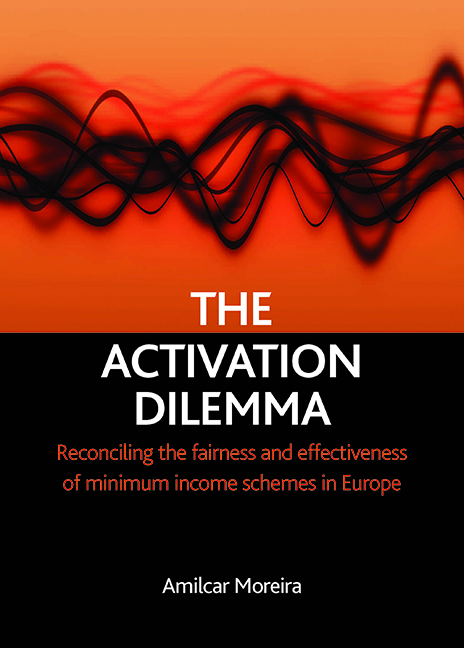 The Activation Dilemma
The Activation Dilemma Book contents
- Frontmatter
- Dedication
- Contents
- List of tables and figures
- List of abbreviations
- Acknowledgements
- one Introduction
- two The right to a minimum income: between Mead and Van Parijs
- three Justifying a minimum income guarantee: the right to personal development
- four The activation dilemma: a comparative study
- five Measuring respect for the right to personal development
- six The employment effectiveness of minimum income schemes
- seven The employment effectiveness of minimum income schemes and their respect for the right to personal development
- eight Conclusion
- Appendix A Methodology for benefit comparison
- Appendix B Unemployment reintegration capacity (URC): sensitivity analysis
- Appendix C Qualitative comparative analysis: laws of Boolean algebra
- References
- Index
- Also available from The Policy Press
- Frontmatter
- Dedication
- Contents
- List of tables and figures
- List of abbreviations
- Acknowledgements
- one Introduction
- two The right to a minimum income: between Mead and Van Parijs
- three Justifying a minimum income guarantee: the right to personal development
- four The activation dilemma: a comparative study
- five Measuring respect for the right to personal development
- six The employment effectiveness of minimum income schemes
- seven The employment effectiveness of minimum income schemes and their respect for the right to personal development
- eight Conclusion
- Appendix A Methodology for benefit comparison
- Appendix B Unemployment reintegration capacity (URC): sensitivity analysis
- Appendix C Qualitative comparative analysis: laws of Boolean algebra
- References
- Index
- Also available from The Policy Press
Summary
At the start of this book, it was argued that the introduction of activation requirements had raised two sorts of questions. The first refers to the way in which the provision of the right to a minimum income can be adequately justified. As seen earlier, this debate is centred on the question of whether the right to a minimum income should be made conditional on an individual's commitment to reciprocate this support by making a contribution to society (mainly through paid employment). This question entails two further issues. The first concerns the opportunities available to individuals for making a contribution to society. The second concerns the activities that can be considered to make a contribution to society.
Bearing in mind the variety of standpoints in the literature, we focused on the arguments posed by Mead and Van Parijs, which typify the fundamental standpoints in this debate, as a means to determine how can the right to a minimum income be adequately justified. We demonstrated that neither Van Parijs, whose argument for a basic income would unfairly favour those who do not want to work, and Mead, who fails to acknowledge the need for individuals to have an effective opportunity to contribute to society and the importance of some forms of non-paid employment (such care or voluntary work) as means to contribute to society, fail to provide an adequate justification of the right to a minimum income. Nonetheless, a closer look at the problems faced by both authors would indicate that a more satisfactory justification was possible.
Taking advantage of the ability of Durkheim's theory of social justice to conciliate social solidarity, personal development and social obligation, this book set out to develop an alternative normative framework to adequately justify the provision of a right to a minimum income. Based on a critical analysis of Durkheim's theory of social justice, it was argued that each individual has a right to exploit his/her talents, which can be exercised while performing a social function in society, such as paid employment, unpaid work in social economy organisations, providing care to dependent family members or improving his/her human capital through education or training.
- Type
- Chapter
- Information
- The Activation DilemmaReconciling the Fairness and Effectiveness of Minimum Income Schemes in Europe, pp. 115 - 126Publisher: Bristol University PressPrint publication year: 2008


